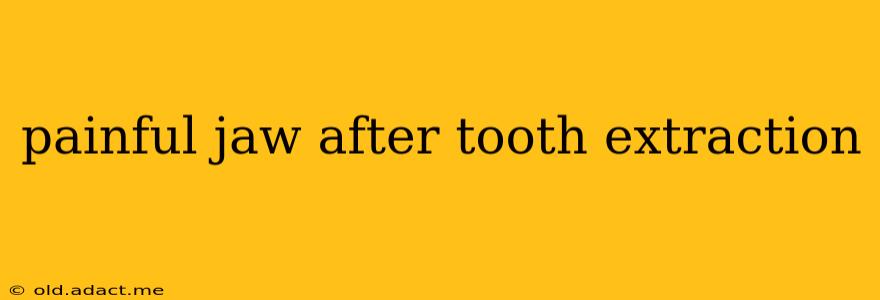Having a painful jaw after a tooth extraction is a common experience, but it's crucial to understand why it happens and how to manage the discomfort. This comprehensive guide will explore the causes of jaw pain post-extraction, effective treatment options, and preventative measures you can take.
What Causes Jaw Pain After Tooth Extraction?
Jaw pain following a tooth extraction stems from several factors, often working in combination. The most common causes include:
- Inflammation and Swelling: The extraction site naturally swells as your body works to heal. This inflammation can put pressure on the surrounding tissues and jaw muscles, leading to pain.
- Dry Socket: A dreaded complication, dry socket occurs when the blood clot protecting the extraction site dislodges or dissolves prematurely. This exposes the bone and nerve endings, causing intense, throbbing pain that often radiates to the jaw.
- Impacted Wisdom Teeth: If the extraction involved a wisdom tooth, particularly an impacted one, the surrounding tissues and jawbone might experience more extensive trauma, resulting in prolonged pain.
- Infection: In some cases, an infection can develop at the extraction site, leading to significant jaw pain, swelling, and other symptoms like fever.
- Muscle Strain: The procedure itself, and the subsequent recovery, can cause strain in the jaw muscles, resulting in pain and stiffness.
- Referred Pain: Pain from the extraction site can sometimes be felt in other areas of the jaw, due to the interconnectedness of nerves and tissues.
- Sinus Issues (Upper Molar Extractions): Extractions of upper molars, especially those close to the sinus cavity, can sometimes cause sinus pain or pressure, manifesting as jaw pain.
How Long Does Jaw Pain After Tooth Extraction Last?
The duration of jaw pain varies greatly depending on the complexity of the extraction, individual healing rates, and the presence of complications. Generally, you should expect some degree of discomfort for the first few days. Most patients experience a significant reduction in pain within a week, but it might take several weeks for the jaw to fully recover. Persistent or worsening pain, particularly after a week, requires immediate consultation with your dentist or oral surgeon.
How to Treat Jaw Pain After Tooth Extraction?
Managing jaw pain effectively involves a multi-pronged approach:
- Medication: Your dentist will likely prescribe pain relievers, such as ibuprofen or stronger narcotics if necessary. Follow the prescribed dosage carefully.
- Ice Packs: Applying ice packs to the affected area for 15-20 minutes at a time, several times a day, can significantly reduce swelling and pain.
- Rest: Give your jaw ample time to rest. Avoid strenuous activities and chewing on the affected side.
- Soft Foods: Stick to a soft food diet for the first few days to avoid putting pressure on the extraction site.
- Saltwater Rinses: Gentle saltwater rinses can help clean the area and promote healing.
- Over-the-Counter Pain Relievers: Nonsteroidal anti-inflammatory drugs (NSAIDs) like ibuprofen can help manage pain and inflammation.
What are the Signs of a Dry Socket?
Identifying a dry socket is critical for timely treatment. Symptoms include:
- Severe, throbbing pain, usually starting 2-3 days after the extraction.
- Visible empty socket (though not always apparent).
- Bad odor or taste.
If you suspect a dry socket, contact your dentist immediately.
Can I Exercise After Tooth Extraction?
Gentle exercise is usually fine after a few days, but avoid strenuous activities that could increase blood pressure or put stress on your jaw for at least a week. Always consult with your dentist before resuming any intense physical activity.
When Should I Call My Dentist?
Contact your dentist if:
- Your pain intensifies or doesn't improve after a few days.
- You develop a fever or other signs of infection.
- You experience excessive bleeding.
- You suspect a dry socket.
- You have any other concerns regarding your healing process.
Following your dentist's post-operative instructions carefully is crucial for a smooth recovery and minimizing the risk of complications. If you experience any unusual symptoms, don't hesitate to seek professional advice. Remember, your dentist is your best resource for managing post-extraction discomfort and ensuring optimal healing.
